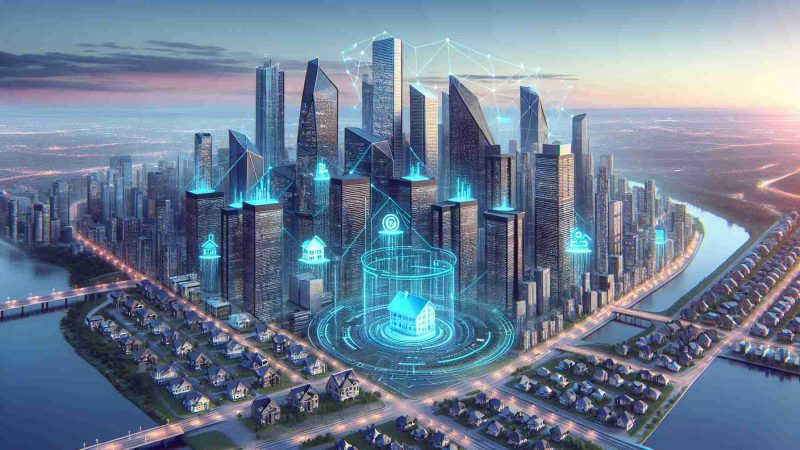China’s Real Estate Innovates! Tech is Changing the Game.

China’s real estate sector, traditionally known for its brick-and-mortar approach, is on the brink of a technological revolution. As the industry grapples with challenges like over-leveraged developers and fluctuating prices, tech innovations are emerging as potential game-changers.
Virtual Reality (VR) and Augmented Reality (AR): These technologies are reshaping how properties are marketed and sold. Prospective buyers can now take immersive virtual tours of properties without stepping inside. This not only enhances the buying experience but also broadens the market reach, allowing international buyers to evaluate properties remotely.
AI-Powered Analytics: Artificial Intelligence is playing a key role in providing deeper insights into market trends and consumer behavior. AI algorithms can predict property price movements and assess investment risks, enabling developers and investors to make more informed decisions.
Blockchain for Transparent Transactions: With concerns about fraud and opaque transactions, blockchain technology is being explored to bring transparency and security to real estate dealings. Smart contracts ensure that once conditions are met, transactions are executed automatically, reducing the reliance on intermediaries.
Sustainable Construction Technologies: As sustainability becomes a global priority, China’s real estate is adopting smart building technologies to create energy-efficient, eco-friendly structures. These advancements not only cater to conscious consumers but also align with government regulations on sustainable development.
The convergence of technology and real estate in China presents a promising frontier, poised to redefine the future landscape of the industry. As these innovations take hold, they could offer solutions to longstanding challenges and set new standards globally.
Tech Transformations in China’s Real Estate: What to Expect Next
As China’s real estate industry undergoes a technological renaissance, the integration of cutting-edge technologies is set to redefine the landscape. Beyond the well-documented innovations like Virtual Reality (VR), Augmented Reality (AR), AI-powered analytics, blockchain, and sustainable construction, new insights and trends are emerging that could further revolutionize the sector.
### Innovations and Emerging Trends
**IoT Integration in Smart Homes:** The Internet of Things (IoT) is becoming increasingly pivotal in the development of smart homes within China. By embedding sensors and connected devices, properties are now capable of offering residents a more convenient, energy-efficient, and secure living experience. From automated lighting and climate control to security systems, IoT is transforming homes into intelligent environments.
**Big Data for Urban Planning:** Utilization of big data in urban planning and development is gaining traction. By analyzing vast amounts of data concerning traffic patterns, population density, and environmental factors, cities are being planned with greater precision and sustainability. This ensures that infrastructure evolves in harmony with tech-driven changes in consumer lifestyles.
### Market Analysis and Predictions
**Rising Interest in PropTech Investments:** The global surge in PropTech investments is making its way into China, fostering a fertile ground for startups and established companies alike. As investors seek to capitalize on the blend of real estate and technology, new funding opportunities are opening up, promising even more dynamic changes in the industry landscape.
**Future Outlook:** The convergence of technology in real estate signifies profound changes ahead. Innovations such as 3D printing in construction and AI-led property management systems are anticipated to become mainstream, leading to reduced costs and improved efficiency. Predictions indicate that these technologies will not only enhance the current market but also set new international benchmarks.
### Pros and Cons
**Pros:**
– **Enhanced Efficiency:** Automation and smart technologies streamline operations, reducing time and resource expenditure.
– **Broader Market Reach:** Technologies like VR and AR have opened Chinese real estate to an international audience, making it easier for foreign investors to participate.
– **Improved Transparency:** Blockchain’s promise of secure and transparent transactions could significantly reduce fraud-related concerns.
**Cons:**
– **Implementation Cost:** The initial investment in technology can be substantial, potentially creating barriers for smaller developers.
– **Security Risks:** As more data is collected and stored digitally, there are heightened concerns over cybersecurity and data breaches.
### Security Aspects
With the growing dependence on digital technologies, cybersecurity has become a paramount concern for China’s real estate market. Protecting the vast amount of data generated from smart technologies requires robust security protocols and constant vigilance to mitigate the risks of cyberattacks.
### Insights and Sustainable Initiatives
The move towards sustainable construction is not only about meeting regulatory requirements but also about tapping into the burgeoning market of eco-conscious consumers. The adoption of renewable energy sources, like solar and wind, alongside efficient waste management systems, is seen as critical for long-term sustainability in real estate developments.
By embracing these next-generation technologies and strategies, China’s real estate market is on a path to potentially set new standards globally. The fusion of tech innovations and traditional practices could provide lasting solutions to current challenges, paving the way for a vibrant future in property development and investment.
For further information on the impact of digital transformation in various sectors, visit the Forbes website.




